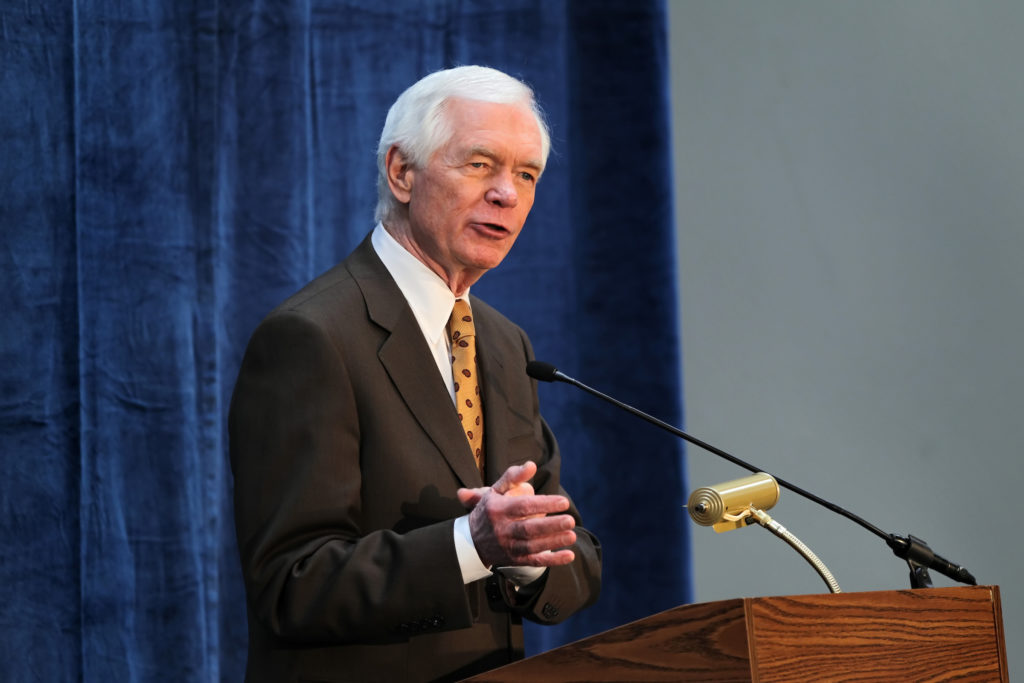
Senator Thad Cochran (R-MS) addressing the 2010 United States Senate Youth delegates.
As application season for the 2020 United States Senate Youth Program begins, we have been reflecting on our history and would like to offer a few highlights from Washington Weeks past. We are featuring four illustrious Senate leaders, who were committed supporters of the program during their long careers on Capitol Hill. We hope you will enjoy reading about and learning from these “Senate Lions” whose work impacted so many lives across the nation.
The late Senator Thad Cochran (1939-2019) was the senior Senator from Mississippi and the United States Senate Youth Program (USSYP) 2010 Co-Chair when he addressed the student delegates in 2010. He had previously served as a Co-Chair in 1992, and served on the USSYP bipartisan Senate Advisory Committee seven times over his lengthy Senate career. He addressed the students as the Ranking Member of the Senate Appropriations Committee in 2010, displaying the depth of his legislative experience at the Mississippi-themed luncheon held in the Senate Hart Building.
First elected to the Senate in 1978, Senator Cochran provided a synopsis of the often mysterious federal budget process, delineating key timeframes as well as the procedural interactions between the executive and legislative branches. He described the bipartisan cooperation he enjoyed with then-Committee Chairman Daniel Inouye of Hawaii, saying that what he enjoyed most about his life in the Senate was “The excitement and opportunity of working with bright, talented people who serve in the Congress and those who are working at high levels of responsibility in the executive branch as well.”
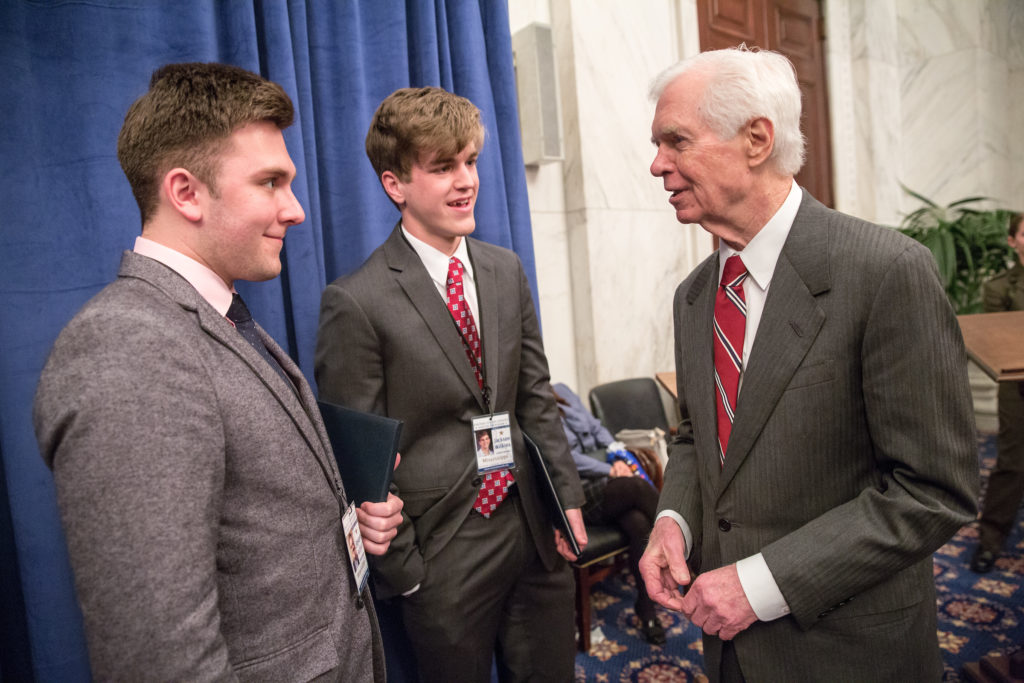
Senator Cochran (R-MS) speaking with 2016 Mississippi delegates Joseph Hasbrouck and Jackson Wilkins.
When asked about the negative perception of budgetary earmarks, he explained, “If we didn’t have earmarks, I guess you could just generally put a big number out beside the Department of Health and Human Services and let the executive branch decide how that amount of money should be spent among all of the programs and activities under its jurisdiction. It would be a ceding of the power by the people’s representatives to the executive branch of how their tax dollars are spent.” When queried about how he had helped effect a decrease in the national deficit, Senator Cochran replied, “I have worked as a member of the Appropriations Committee, generally speaking, to be cautious, to make sure that the funds that we are approving are needed, that they are authorized by law, that they serve the public interest, that they are consistent with our budget that’s adopted by Congress every year, and that the committee plays by the rules.”
The Senator closed his remarks noting that the USSYP is one program Senators love participating in as much as the students. “They don’t just take anybody into this program,” he said, with a twinkle in his eye.
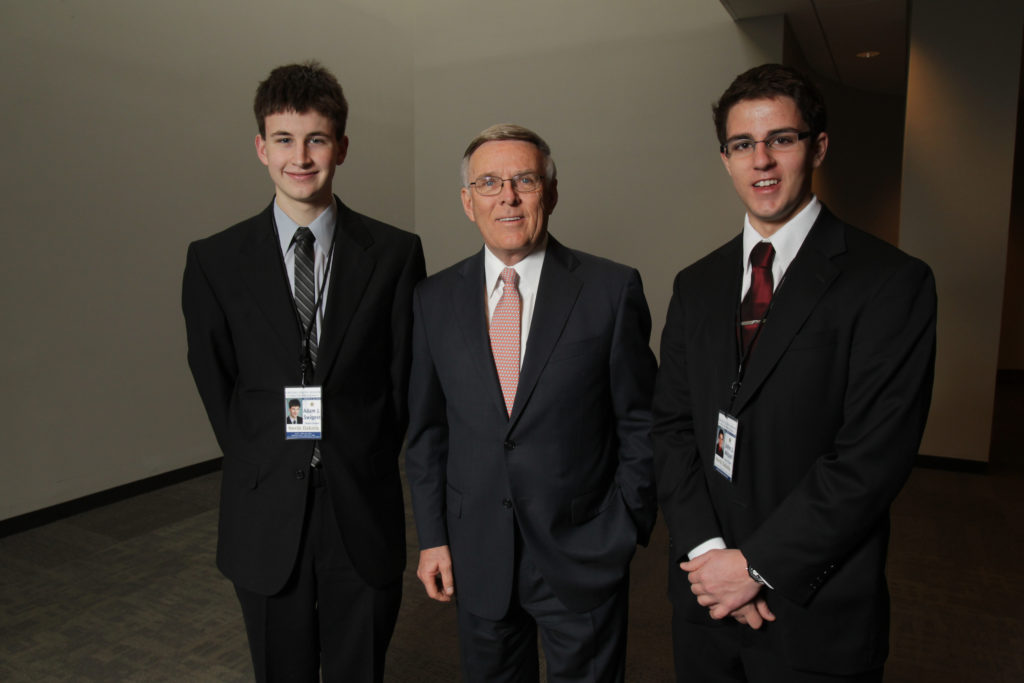
Senator Byron Dorgan (D-ND) with 2010 North Dakota delegates Adam Swigost and John Mitzel.
In a 2010 speech filled with quiet passion and insight, Senator Byron Dorgan of North Dakota, who had announced his retirement from the Senate earlier in the year, inspired the delegates with key ideas and historical lessons gleaned from a thirty-year career in public service. He recounted some history of the Senate through the provenance of several desks in the Senate chamber, including his own at which Senator Robert LaFollette was poisoned in 1908. He urged the students to continue to study and learn from history because “understanding the history of our country teaches you where we’ve been and what we’ve done and the importance of those lessons for the future.”
He then told the stories of Alice Paul and Lucy Burns, women’s rights activists who sought the vote in 1917 and were brutally beaten and tortured, as well as the story of Congressman John Lewis who was also severely beaten for drinking from a “whites only” water fountain during the struggle for civil rights decades later. He shared, “My point is that change is hard, and those who advocate change are always called ‘radical’ by those who cling to what is.”
Describing the best speech he ever heard, Senator Dorgan told the story of Polish leader Lech Walesa, who, speaking before a Joint Session of Congress, described the energy behind the Solidarity movement. ‘We were workers, men and women, banded together believing that people ought to be able to choose their own destiny,’ he quoted, “Understand this: ideas are more powerful than guns.” One delegate asked Senator Dorgan about how he was able to serve as State Tax Commissioner at the young age of 26. “My notion has always been like that of a runner in football – if you see daylight just run for it,” said the Senator. “Never undersell your talents. In the years ahead, take a look at the table set in front of you and when you have an opportunity just say, ‘I can do this. I really can do this.’ It is all about attitude, in my judgment.”
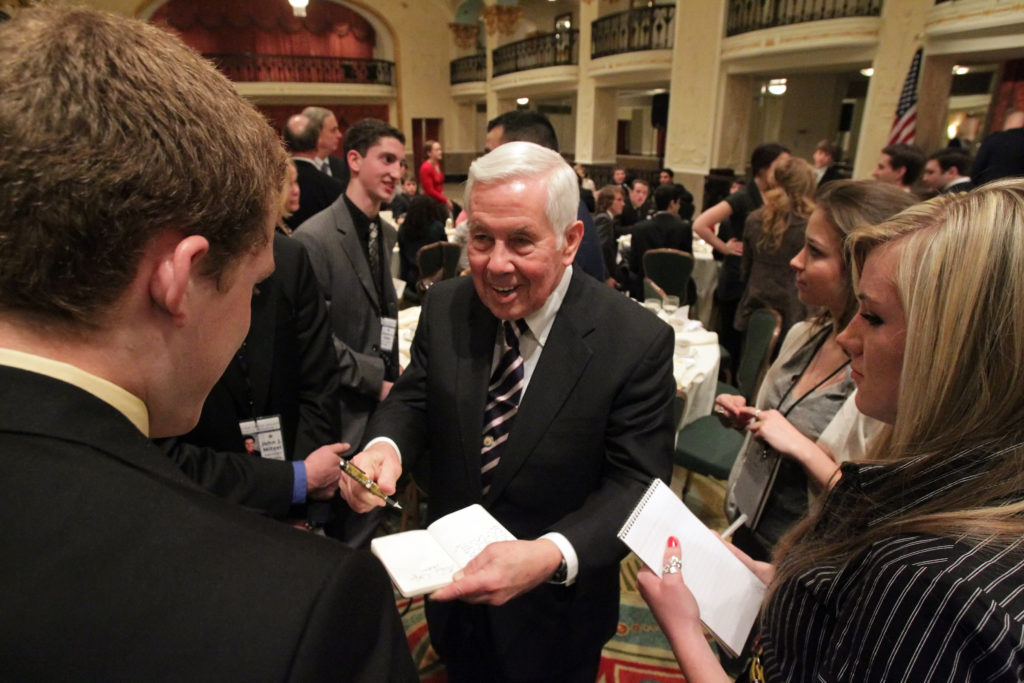
Senator Richard Lugar (R-IN) signs autographs after his Co-Chair keynote address in 2010.
The late Senator Richard G. Lugar (1932-2019), the longest serving U.S. Senator in Indiana history, was an ardent supporter of the United States Senate Youth Program, serving as the Republican Co-Chair four times, and serving on the Advisory Committee six times. He made special efforts to meet and congratulate Indiana’s USSYP delegates nearly every year of his Senate tenure – more than 25 times.
The Senator began his 2010 keynote remarks to the students by giving a recounting of the day’s schedule, “To bring to the fore certain issues that are paramount in the eyes of the Congress and the President, likewise I think of considerable interest to you.” As the Ranking Member of the Senate Foreign Relations Committee that year, he began the early March day with a visit from the Australian Ambassador to the U.S., who wanted to understand why an important and symbolic arms treaty had not been signed by the Americans. The Senator, a Rhodes Scholar and deeply respected expert on foreign policy, then launched into a discussion of congressional vs. executive branch authority over foreign affairs.
Senator Lugar described an overture he made to then-fellow Foreign Relations Committee Member Senator John Kerry of Massachusetts to resolve the treaty issue in a bipartisan way. “Our Senate and House procedures are sometimes characterized as fractured, or gridlocked,” Senator Lugar said, “but there is a very strong bipartisan strain, and it is an important thing to emphasize.” The delegates were then given details of the Senator’s meeting that followed with President Obama at the White House to review climate change legislation. He told the students of his suggestion to the President to frame the issue as one of national security. “It is an old theme enunciated by at least the last four presidents…that we are far too dependent upon foreign oil,” said Senator Lugar, “but the facts of life are that from the time that Franklin Roosevelt met with the Kingdom of Saudi Arabia there was at least an implicit, if not explicit, idea that we needed the oil and that we are prepared to provide defense for those nations in case others intruded upon their sovereignty.”
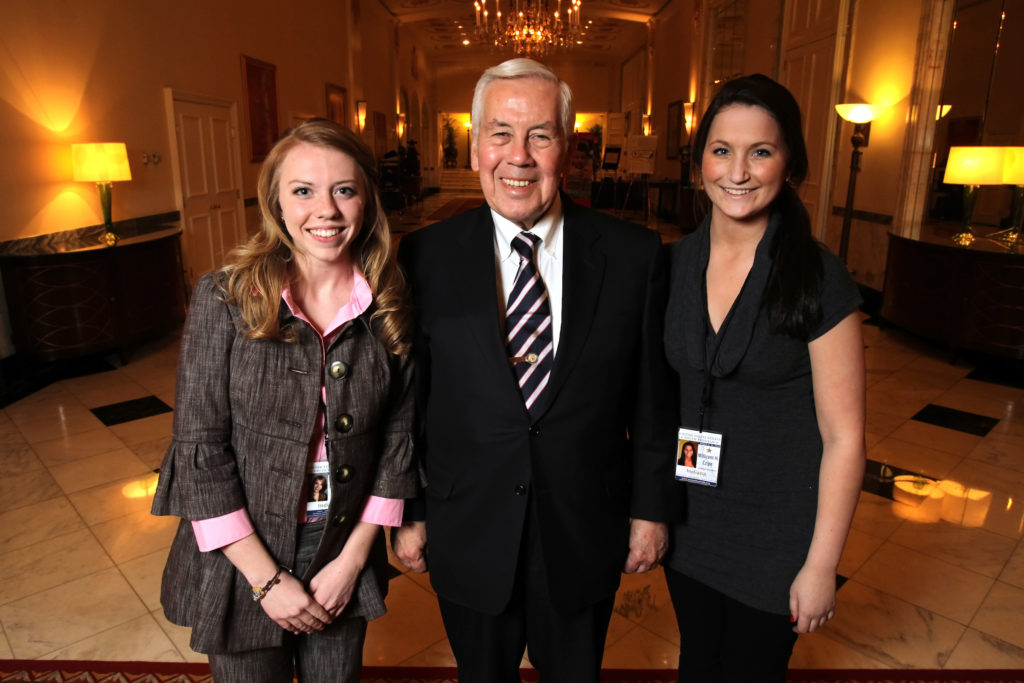
Senator Lugar (R-IN) with 2010 Indiana delegates Madeleine Clark and Millicent Cripe.
The delegates took part in an intensive question and answer period on topics as diverse as the Non-Proliferation Treaty Conference, the START talks, the Citizens United Supreme Court case, self-governing rights for native Hawaiians, the use of cloture and a two-state solution for Israel and Palestine. Senator Lugar added that he was proud of several controversial stances he had taken over the years, particularly in utilizing his leadership role to promote democracy in the Philippines and anti-apartheid efforts in South Africa.
In closing, the Senator told the delegates, “I would encourage it of each one of you that a part of your life might be spent in public service, if not in elected office, in appointive offices in which you can give of yourselves, of your intellect, of your hearts to so many people who really need you.”
Joseph Sacks, a 2010 Rhode Island delegate, summed up his experience hearing these esteemed statesmen of the Senate, saying, “My generation is going to lead our nation in a pivotal moment in its history. In Washington, the most powerful people in the country met with our group. Their demeanor did not reflect their superiority over us, but instead it reflected their hope in us. They understood what we did not at the time, that we would be the ones to fill their shoes. We must be educated and trained on how to advance our country and the world. The United States Senate Youth Program did just that. It told us that leadership is not position; it is action.”
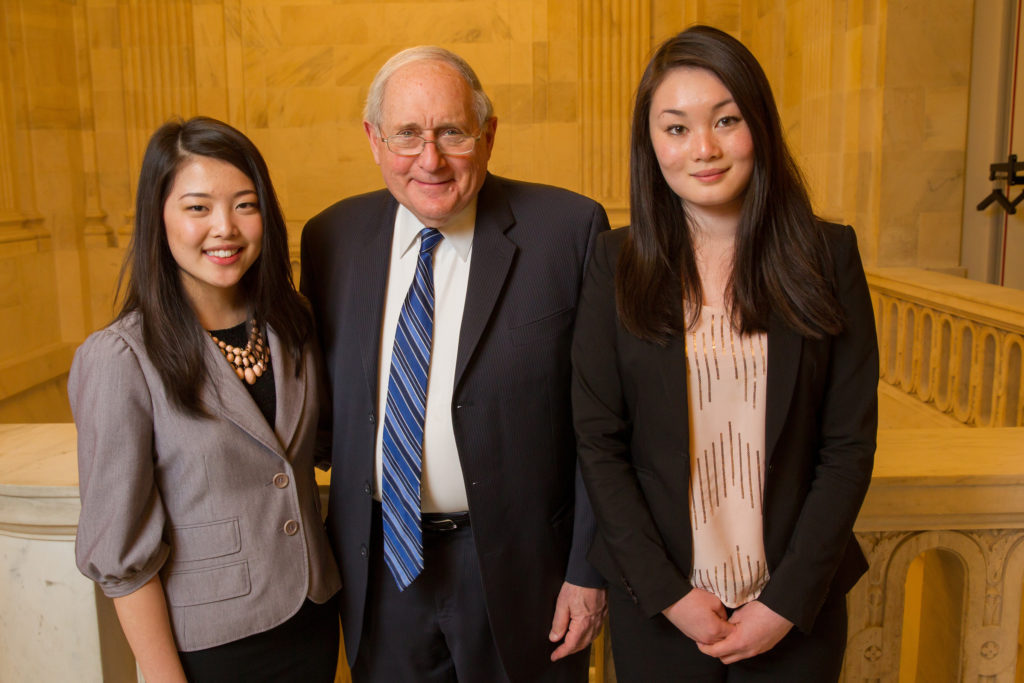
Senator Carl Levin (D-MI) with 2014 Michigan delegates Katharine Wang and Jacqueline Qui
Michigan Democratic Senator Carl Levin’s unassuming demeanor belied his vaunted position as Chairman of the Senate Armed Services Committee when he spoke with USSYP delegates in 2014. While in the Senate, he was a leader on major policy initiatives involving justice, safety and equality since he began his first term in 1979, ultimately serving 36 years before returning to his home state.
“We don’t hear enough about some of the great things that we do in government,” he said, “and the differences we’ve made in peoples’ lives.” He noted that American military forces provide security not only at home, but for millions around the world. He credited the G.I. Bill after World War II with allowing 15 million veterans to attain a college education and cited Pell Grants and other federal student loan programs as critical to the country’s future. The Head Start program for disadvantaged children and families, laws and agencies to protect the environment and laws to protect and support the disabled were also given as evidence of government’s effectiveness.
Born to a family of public servants, Senator Levin nevertheless was not single-minded of purpose in pursuing a Senate seat at the outset of his career. Noting several early disappointments when he was not awarded or appointed to positions he had coveted, he gave the delegates this heartfelt counsel, “Just when you think you’ve had a streak of bad luck, it could turn out to be the best thing that ever happened to you. It happens all the time in life, where something that is disappointing, or you think of as a setback, turns out to be a very lucky break.”
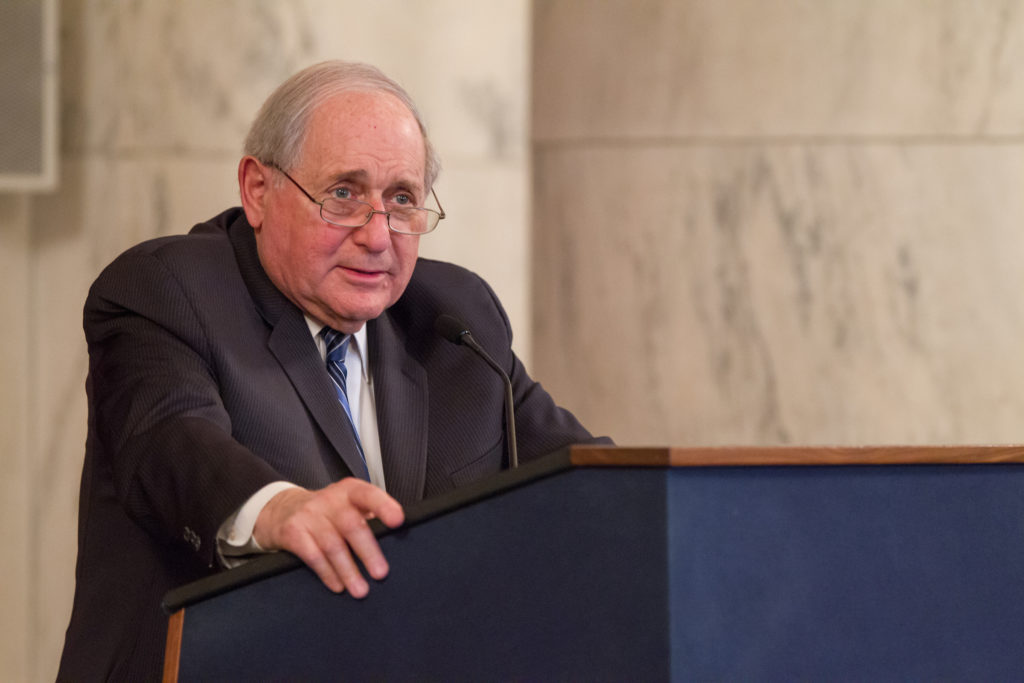
Senator Levin (D-MI) addressing the 2014 United States Senate Youth delegates..
The students had many questions for the Committee Chairman, including whether America can fulfill the role of “police officer” of the world. “The world needs a police officer,” he said, “It doesn’t have one, and we can’t be the police officer for the world, but we can make a difference. We’ve made a difference in a lot of places, and there are some places where we have failed to make a difference. But there is no other possibility except us joining with allies such as NATO or a coalition of the willing to act in our own security interest, which is what must drive us. I wish the world had a better alternative than us being a leader, but it really doesn’t.”
Senator Levin also gave the students an excellent perspective on leadership and courage, guiding them to find a separate career they are passionate about as a primary pursuit before setting forth in local government on the path to politics. “That way you always have something else you can and want to do as a career, so you can vote your conscience,” he said, speaking as one who did.
© Photos by Jakub Mosur and Erin Lubin
